Accounting Fraud Prevention: A Structured Literature Review Report
VerifiedAdded on 2023/03/20
|6
|1853
|76
Report
AI Summary
This report presents a structured literature review on accounting fraud prevention, drawing on four academic articles. The review begins with an introduction that outlines the scope of the study, followed by summaries and theoretical frameworks described in each article. The report then examines the common and different themes across the articles, highlighting the various perspectives on fraud prevention, including the role of IT, forensic accounting, IFRS, and reporting bias. The managerial implications of the findings are discussed, emphasizing the importance of auditing skills, forensic accounting, and information systems in mitigating and preventing fraudulent activities. The study also addresses the limitations of the research and suggests directions for future research, such as mixed-method analysis and addressing staffing deficiencies. The report concludes by emphasizing the need for further research to improve current models of fraud prevention.
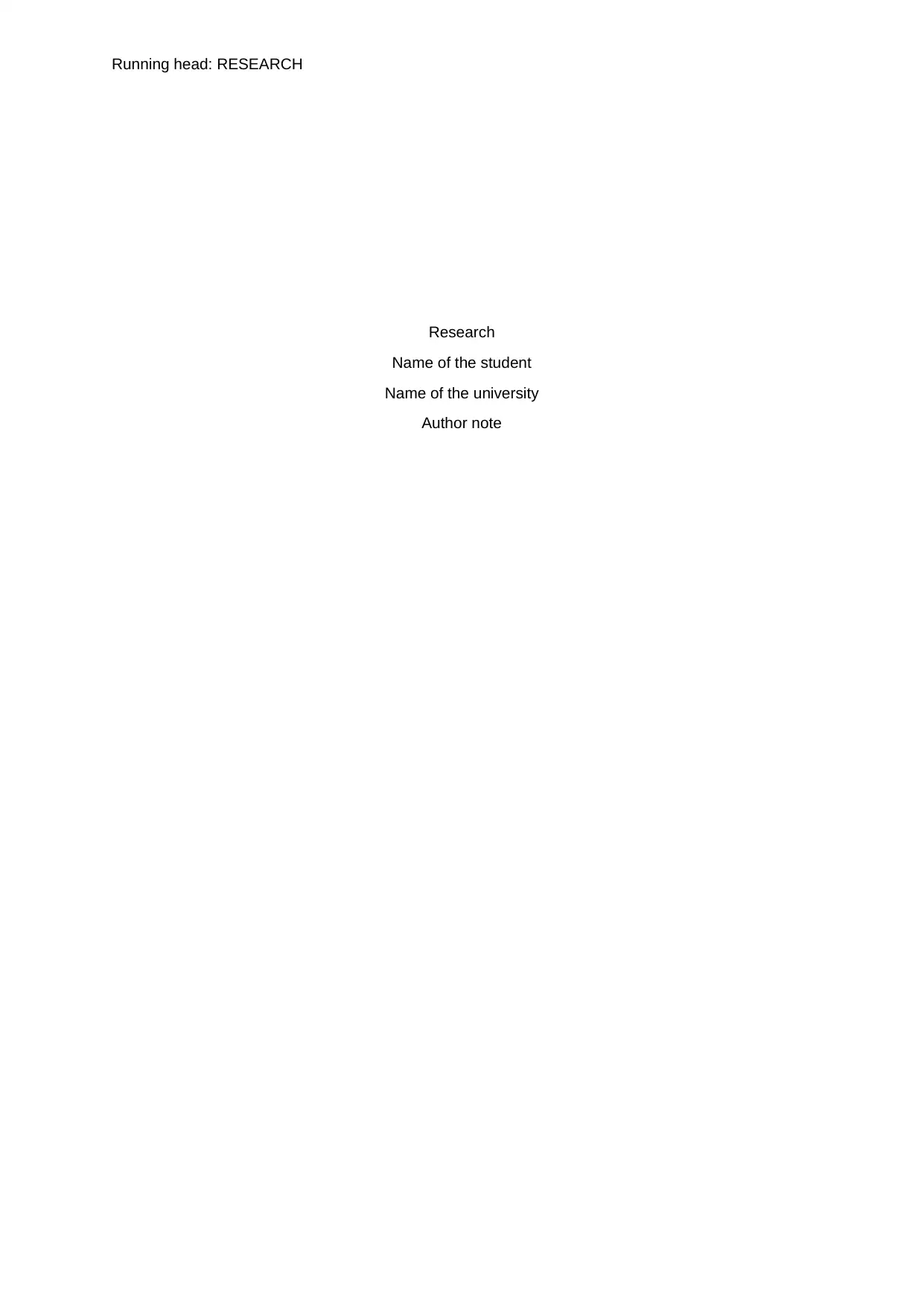
Running head: RESEARCH
Research
Name of the student
Name of the university
Author note
Research
Name of the student
Name of the university
Author note
Paraphrase This Document
Need a fresh take? Get an instant paraphrase of this document with our AI Paraphraser
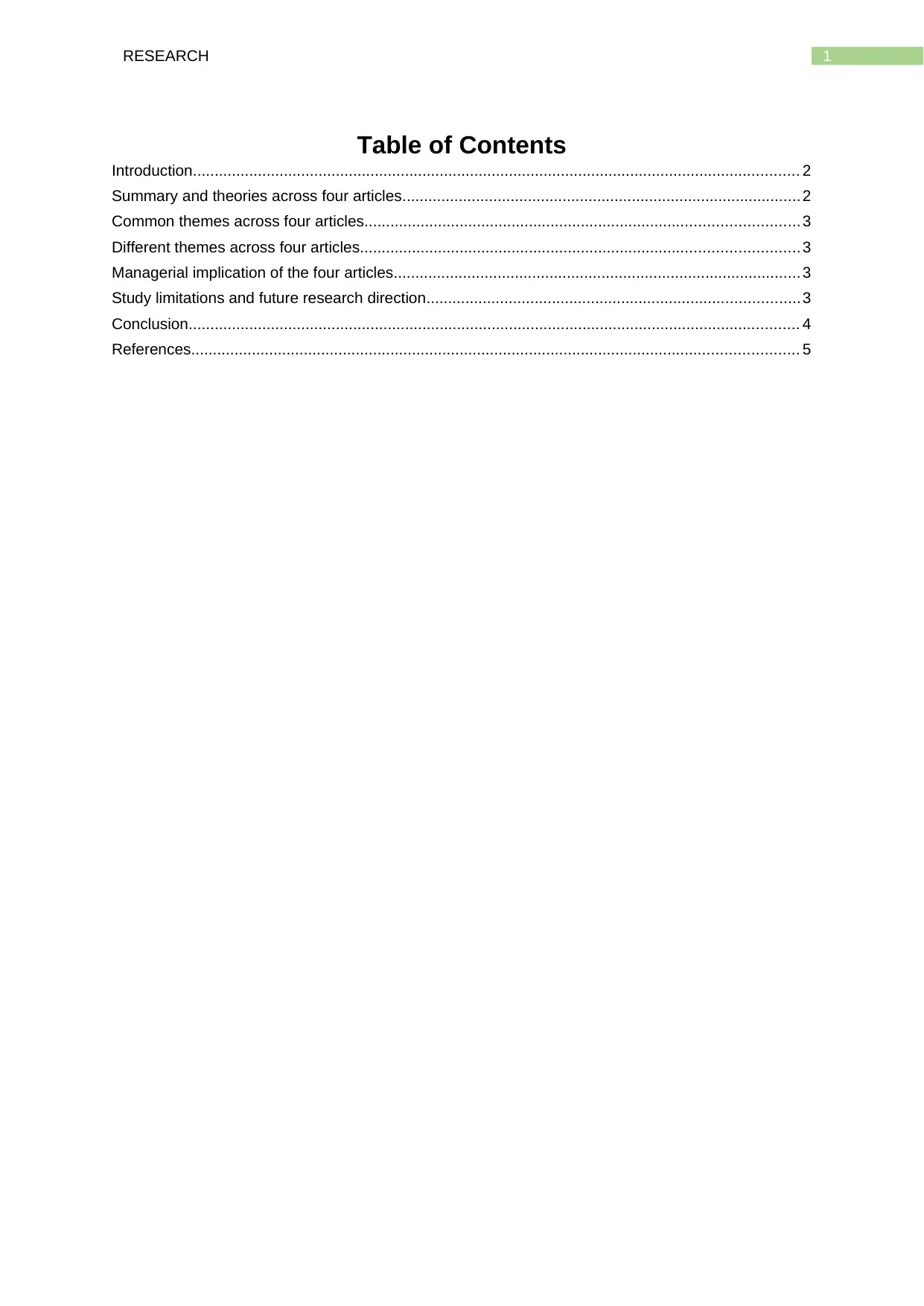
1RESEARCH
Table of Contents
Introduction............................................................................................................................................ 2
Summary and theories across four articles............................................................................................ 2
Common themes across four articles.................................................................................................... 3
Different themes across four articles..................................................................................................... 3
Managerial implication of the four articles.............................................................................................. 3
Study limitations and future research direction......................................................................................3
Conclusion............................................................................................................................................. 4
References............................................................................................................................................ 5
Table of Contents
Introduction............................................................................................................................................ 2
Summary and theories across four articles............................................................................................ 2
Common themes across four articles.................................................................................................... 3
Different themes across four articles..................................................................................................... 3
Managerial implication of the four articles.............................................................................................. 3
Study limitations and future research direction......................................................................................3
Conclusion............................................................................................................................................. 4
References............................................................................................................................................ 5
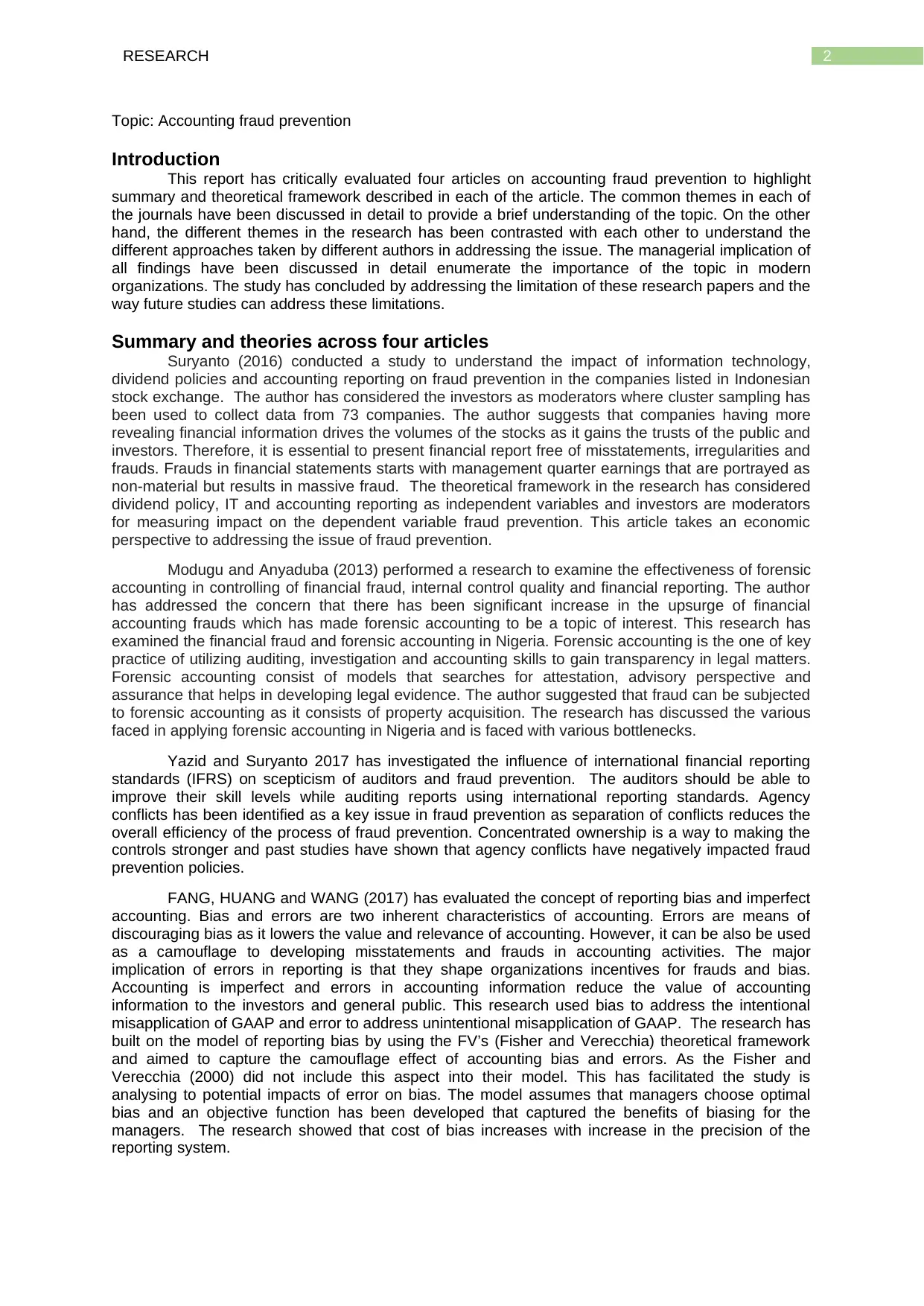
2RESEARCH
Topic: Accounting fraud prevention
Introduction
This report has critically evaluated four articles on accounting fraud prevention to highlight
summary and theoretical framework described in each of the article. The common themes in each of
the journals have been discussed in detail to provide a brief understanding of the topic. On the other
hand, the different themes in the research has been contrasted with each other to understand the
different approaches taken by different authors in addressing the issue. The managerial implication of
all findings have been discussed in detail enumerate the importance of the topic in modern
organizations. The study has concluded by addressing the limitation of these research papers and the
way future studies can address these limitations.
Summary and theories across four articles
Suryanto (2016) conducted a study to understand the impact of information technology,
dividend policies and accounting reporting on fraud prevention in the companies listed in Indonesian
stock exchange. The author has considered the investors as moderators where cluster sampling has
been used to collect data from 73 companies. The author suggests that companies having more
revealing financial information drives the volumes of the stocks as it gains the trusts of the public and
investors. Therefore, it is essential to present financial report free of misstatements, irregularities and
frauds. Frauds in financial statements starts with management quarter earnings that are portrayed as
non-material but results in massive fraud. The theoretical framework in the research has considered
dividend policy, IT and accounting reporting as independent variables and investors are moderators
for measuring impact on the dependent variable fraud prevention. This article takes an economic
perspective to addressing the issue of fraud prevention.
Modugu and Anyaduba (2013) performed a research to examine the effectiveness of forensic
accounting in controlling of financial fraud, internal control quality and financial reporting. The author
has addressed the concern that there has been significant increase in the upsurge of financial
accounting frauds which has made forensic accounting to be a topic of interest. This research has
examined the financial fraud and forensic accounting in Nigeria. Forensic accounting is the one of key
practice of utilizing auditing, investigation and accounting skills to gain transparency in legal matters.
Forensic accounting consist of models that searches for attestation, advisory perspective and
assurance that helps in developing legal evidence. The author suggested that fraud can be subjected
to forensic accounting as it consists of property acquisition. The research has discussed the various
faced in applying forensic accounting in Nigeria and is faced with various bottlenecks.
Yazid and Suryanto 2017 has investigated the influence of international financial reporting
standards (IFRS) on scepticism of auditors and fraud prevention. The auditors should be able to
improve their skill levels while auditing reports using international reporting standards. Agency
conflicts has been identified as a key issue in fraud prevention as separation of conflicts reduces the
overall efficiency of the process of fraud prevention. Concentrated ownership is a way to making the
controls stronger and past studies have shown that agency conflicts have negatively impacted fraud
prevention policies.
FANG, HUANG and WANG (2017) has evaluated the concept of reporting bias and imperfect
accounting. Bias and errors are two inherent characteristics of accounting. Errors are means of
discouraging bias as it lowers the value and relevance of accounting. However, it can be also be used
as a camouflage to developing misstatements and frauds in accounting activities. The major
implication of errors in reporting is that they shape organizations incentives for frauds and bias.
Accounting is imperfect and errors in accounting information reduce the value of accounting
information to the investors and general public. This research used bias to address the intentional
misapplication of GAAP and error to address unintentional misapplication of GAAP. The research has
built on the model of reporting bias by using the FV’s (Fisher and Verecchia) theoretical framework
and aimed to capture the camouflage effect of accounting bias and errors. As the Fisher and
Verecchia (2000) did not include this aspect into their model. This has facilitated the study is
analysing to potential impacts of error on bias. The model assumes that managers choose optimal
bias and an objective function has been developed that captured the benefits of biasing for the
managers. The research showed that cost of bias increases with increase in the precision of the
reporting system.
Topic: Accounting fraud prevention
Introduction
This report has critically evaluated four articles on accounting fraud prevention to highlight
summary and theoretical framework described in each of the article. The common themes in each of
the journals have been discussed in detail to provide a brief understanding of the topic. On the other
hand, the different themes in the research has been contrasted with each other to understand the
different approaches taken by different authors in addressing the issue. The managerial implication of
all findings have been discussed in detail enumerate the importance of the topic in modern
organizations. The study has concluded by addressing the limitation of these research papers and the
way future studies can address these limitations.
Summary and theories across four articles
Suryanto (2016) conducted a study to understand the impact of information technology,
dividend policies and accounting reporting on fraud prevention in the companies listed in Indonesian
stock exchange. The author has considered the investors as moderators where cluster sampling has
been used to collect data from 73 companies. The author suggests that companies having more
revealing financial information drives the volumes of the stocks as it gains the trusts of the public and
investors. Therefore, it is essential to present financial report free of misstatements, irregularities and
frauds. Frauds in financial statements starts with management quarter earnings that are portrayed as
non-material but results in massive fraud. The theoretical framework in the research has considered
dividend policy, IT and accounting reporting as independent variables and investors are moderators
for measuring impact on the dependent variable fraud prevention. This article takes an economic
perspective to addressing the issue of fraud prevention.
Modugu and Anyaduba (2013) performed a research to examine the effectiveness of forensic
accounting in controlling of financial fraud, internal control quality and financial reporting. The author
has addressed the concern that there has been significant increase in the upsurge of financial
accounting frauds which has made forensic accounting to be a topic of interest. This research has
examined the financial fraud and forensic accounting in Nigeria. Forensic accounting is the one of key
practice of utilizing auditing, investigation and accounting skills to gain transparency in legal matters.
Forensic accounting consist of models that searches for attestation, advisory perspective and
assurance that helps in developing legal evidence. The author suggested that fraud can be subjected
to forensic accounting as it consists of property acquisition. The research has discussed the various
faced in applying forensic accounting in Nigeria and is faced with various bottlenecks.
Yazid and Suryanto 2017 has investigated the influence of international financial reporting
standards (IFRS) on scepticism of auditors and fraud prevention. The auditors should be able to
improve their skill levels while auditing reports using international reporting standards. Agency
conflicts has been identified as a key issue in fraud prevention as separation of conflicts reduces the
overall efficiency of the process of fraud prevention. Concentrated ownership is a way to making the
controls stronger and past studies have shown that agency conflicts have negatively impacted fraud
prevention policies.
FANG, HUANG and WANG (2017) has evaluated the concept of reporting bias and imperfect
accounting. Bias and errors are two inherent characteristics of accounting. Errors are means of
discouraging bias as it lowers the value and relevance of accounting. However, it can be also be used
as a camouflage to developing misstatements and frauds in accounting activities. The major
implication of errors in reporting is that they shape organizations incentives for frauds and bias.
Accounting is imperfect and errors in accounting information reduce the value of accounting
information to the investors and general public. This research used bias to address the intentional
misapplication of GAAP and error to address unintentional misapplication of GAAP. The research has
built on the model of reporting bias by using the FV’s (Fisher and Verecchia) theoretical framework
and aimed to capture the camouflage effect of accounting bias and errors. As the Fisher and
Verecchia (2000) did not include this aspect into their model. This has facilitated the study is
analysing to potential impacts of error on bias. The model assumes that managers choose optimal
bias and an objective function has been developed that captured the benefits of biasing for the
managers. The research showed that cost of bias increases with increase in the precision of the
reporting system.
⊘ This is a preview!⊘
Do you want full access?
Subscribe today to unlock all pages.

Trusted by 1+ million students worldwide
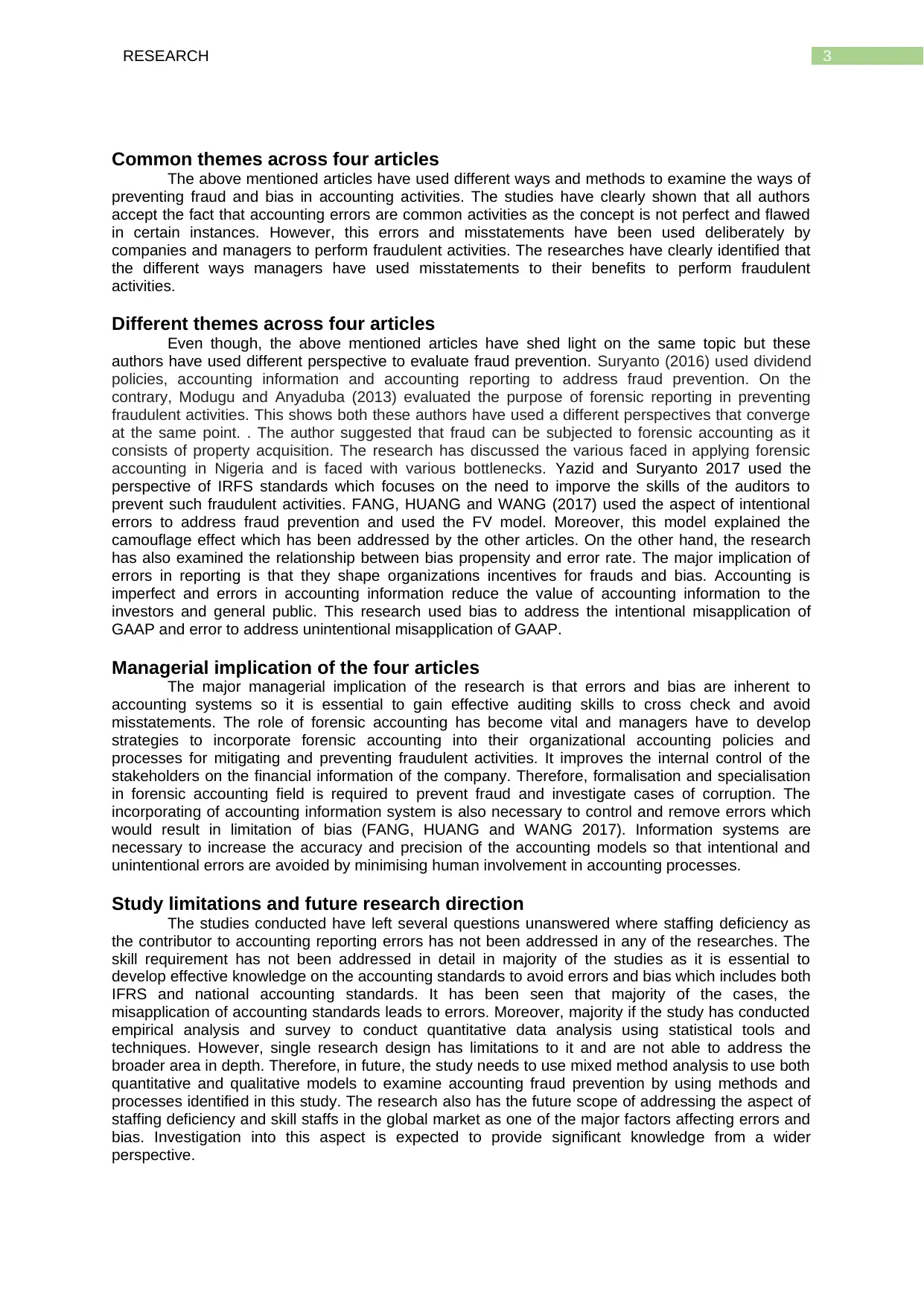
3RESEARCH
Common themes across four articles
The above mentioned articles have used different ways and methods to examine the ways of
preventing fraud and bias in accounting activities. The studies have clearly shown that all authors
accept the fact that accounting errors are common activities as the concept is not perfect and flawed
in certain instances. However, this errors and misstatements have been used deliberately by
companies and managers to perform fraudulent activities. The researches have clearly identified that
the different ways managers have used misstatements to their benefits to perform fraudulent
activities.
Different themes across four articles
Even though, the above mentioned articles have shed light on the same topic but these
authors have used different perspective to evaluate fraud prevention. Suryanto (2016) used dividend
policies, accounting information and accounting reporting to address fraud prevention. On the
contrary, Modugu and Anyaduba (2013) evaluated the purpose of forensic reporting in preventing
fraudulent activities. This shows both these authors have used a different perspectives that converge
at the same point. . The author suggested that fraud can be subjected to forensic accounting as it
consists of property acquisition. The research has discussed the various faced in applying forensic
accounting in Nigeria and is faced with various bottlenecks. Yazid and Suryanto 2017 used the
perspective of IRFS standards which focuses on the need to imporve the skills of the auditors to
prevent such fraudulent activities. FANG, HUANG and WANG (2017) used the aspect of intentional
errors to address fraud prevention and used the FV model. Moreover, this model explained the
camouflage effect which has been addressed by the other articles. On the other hand, the research
has also examined the relationship between bias propensity and error rate. The major implication of
errors in reporting is that they shape organizations incentives for frauds and bias. Accounting is
imperfect and errors in accounting information reduce the value of accounting information to the
investors and general public. This research used bias to address the intentional misapplication of
GAAP and error to address unintentional misapplication of GAAP.
Managerial implication of the four articles
The major managerial implication of the research is that errors and bias are inherent to
accounting systems so it is essential to gain effective auditing skills to cross check and avoid
misstatements. The role of forensic accounting has become vital and managers have to develop
strategies to incorporate forensic accounting into their organizational accounting policies and
processes for mitigating and preventing fraudulent activities. It improves the internal control of the
stakeholders on the financial information of the company. Therefore, formalisation and specialisation
in forensic accounting field is required to prevent fraud and investigate cases of corruption. The
incorporating of accounting information system is also necessary to control and remove errors which
would result in limitation of bias (FANG, HUANG and WANG 2017). Information systems are
necessary to increase the accuracy and precision of the accounting models so that intentional and
unintentional errors are avoided by minimising human involvement in accounting processes.
Study limitations and future research direction
The studies conducted have left several questions unanswered where staffing deficiency as
the contributor to accounting reporting errors has not been addressed in any of the researches. The
skill requirement has not been addressed in detail in majority of the studies as it is essential to
develop effective knowledge on the accounting standards to avoid errors and bias which includes both
IFRS and national accounting standards. It has been seen that majority of the cases, the
misapplication of accounting standards leads to errors. Moreover, majority if the study has conducted
empirical analysis and survey to conduct quantitative data analysis using statistical tools and
techniques. However, single research design has limitations to it and are not able to address the
broader area in depth. Therefore, in future, the study needs to use mixed method analysis to use both
quantitative and qualitative models to examine accounting fraud prevention by using methods and
processes identified in this study. The research also has the future scope of addressing the aspect of
staffing deficiency and skill staffs in the global market as one of the major factors affecting errors and
bias. Investigation into this aspect is expected to provide significant knowledge from a wider
perspective.
Common themes across four articles
The above mentioned articles have used different ways and methods to examine the ways of
preventing fraud and bias in accounting activities. The studies have clearly shown that all authors
accept the fact that accounting errors are common activities as the concept is not perfect and flawed
in certain instances. However, this errors and misstatements have been used deliberately by
companies and managers to perform fraudulent activities. The researches have clearly identified that
the different ways managers have used misstatements to their benefits to perform fraudulent
activities.
Different themes across four articles
Even though, the above mentioned articles have shed light on the same topic but these
authors have used different perspective to evaluate fraud prevention. Suryanto (2016) used dividend
policies, accounting information and accounting reporting to address fraud prevention. On the
contrary, Modugu and Anyaduba (2013) evaluated the purpose of forensic reporting in preventing
fraudulent activities. This shows both these authors have used a different perspectives that converge
at the same point. . The author suggested that fraud can be subjected to forensic accounting as it
consists of property acquisition. The research has discussed the various faced in applying forensic
accounting in Nigeria and is faced with various bottlenecks. Yazid and Suryanto 2017 used the
perspective of IRFS standards which focuses on the need to imporve the skills of the auditors to
prevent such fraudulent activities. FANG, HUANG and WANG (2017) used the aspect of intentional
errors to address fraud prevention and used the FV model. Moreover, this model explained the
camouflage effect which has been addressed by the other articles. On the other hand, the research
has also examined the relationship between bias propensity and error rate. The major implication of
errors in reporting is that they shape organizations incentives for frauds and bias. Accounting is
imperfect and errors in accounting information reduce the value of accounting information to the
investors and general public. This research used bias to address the intentional misapplication of
GAAP and error to address unintentional misapplication of GAAP.
Managerial implication of the four articles
The major managerial implication of the research is that errors and bias are inherent to
accounting systems so it is essential to gain effective auditing skills to cross check and avoid
misstatements. The role of forensic accounting has become vital and managers have to develop
strategies to incorporate forensic accounting into their organizational accounting policies and
processes for mitigating and preventing fraudulent activities. It improves the internal control of the
stakeholders on the financial information of the company. Therefore, formalisation and specialisation
in forensic accounting field is required to prevent fraud and investigate cases of corruption. The
incorporating of accounting information system is also necessary to control and remove errors which
would result in limitation of bias (FANG, HUANG and WANG 2017). Information systems are
necessary to increase the accuracy and precision of the accounting models so that intentional and
unintentional errors are avoided by minimising human involvement in accounting processes.
Study limitations and future research direction
The studies conducted have left several questions unanswered where staffing deficiency as
the contributor to accounting reporting errors has not been addressed in any of the researches. The
skill requirement has not been addressed in detail in majority of the studies as it is essential to
develop effective knowledge on the accounting standards to avoid errors and bias which includes both
IFRS and national accounting standards. It has been seen that majority of the cases, the
misapplication of accounting standards leads to errors. Moreover, majority if the study has conducted
empirical analysis and survey to conduct quantitative data analysis using statistical tools and
techniques. However, single research design has limitations to it and are not able to address the
broader area in depth. Therefore, in future, the study needs to use mixed method analysis to use both
quantitative and qualitative models to examine accounting fraud prevention by using methods and
processes identified in this study. The research also has the future scope of addressing the aspect of
staffing deficiency and skill staffs in the global market as one of the major factors affecting errors and
bias. Investigation into this aspect is expected to provide significant knowledge from a wider
perspective.
Paraphrase This Document
Need a fresh take? Get an instant paraphrase of this document with our AI Paraphraser
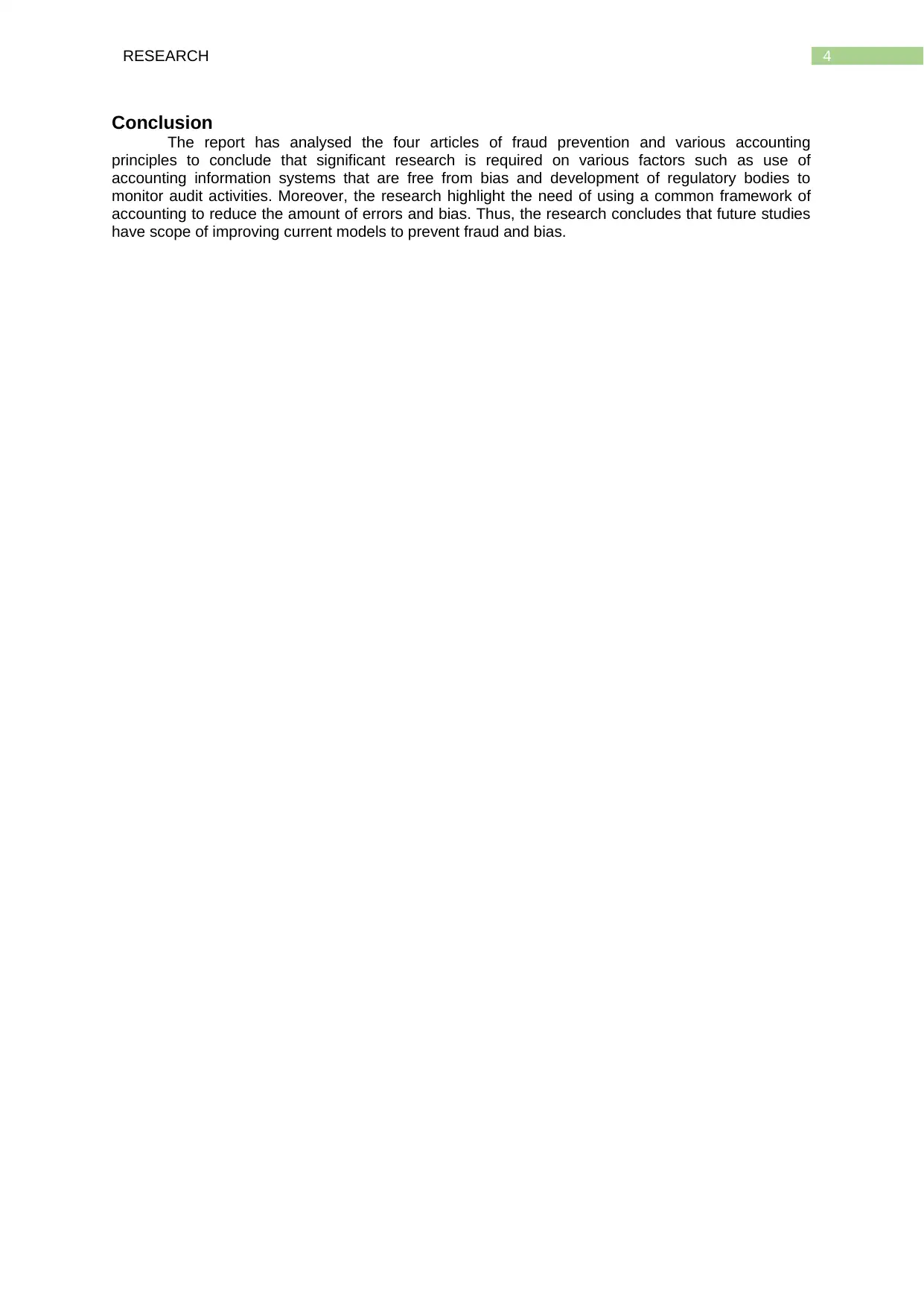
4RESEARCH
Conclusion
The report has analysed the four articles of fraud prevention and various accounting
principles to conclude that significant research is required on various factors such as use of
accounting information systems that are free from bias and development of regulatory bodies to
monitor audit activities. Moreover, the research highlight the need of using a common framework of
accounting to reduce the amount of errors and bias. Thus, the research concludes that future studies
have scope of improving current models to prevent fraud and bias.
Conclusion
The report has analysed the four articles of fraud prevention and various accounting
principles to conclude that significant research is required on various factors such as use of
accounting information systems that are free from bias and development of regulatory bodies to
monitor audit activities. Moreover, the research highlight the need of using a common framework of
accounting to reduce the amount of errors and bias. Thus, the research concludes that future studies
have scope of improving current models to prevent fraud and bias.
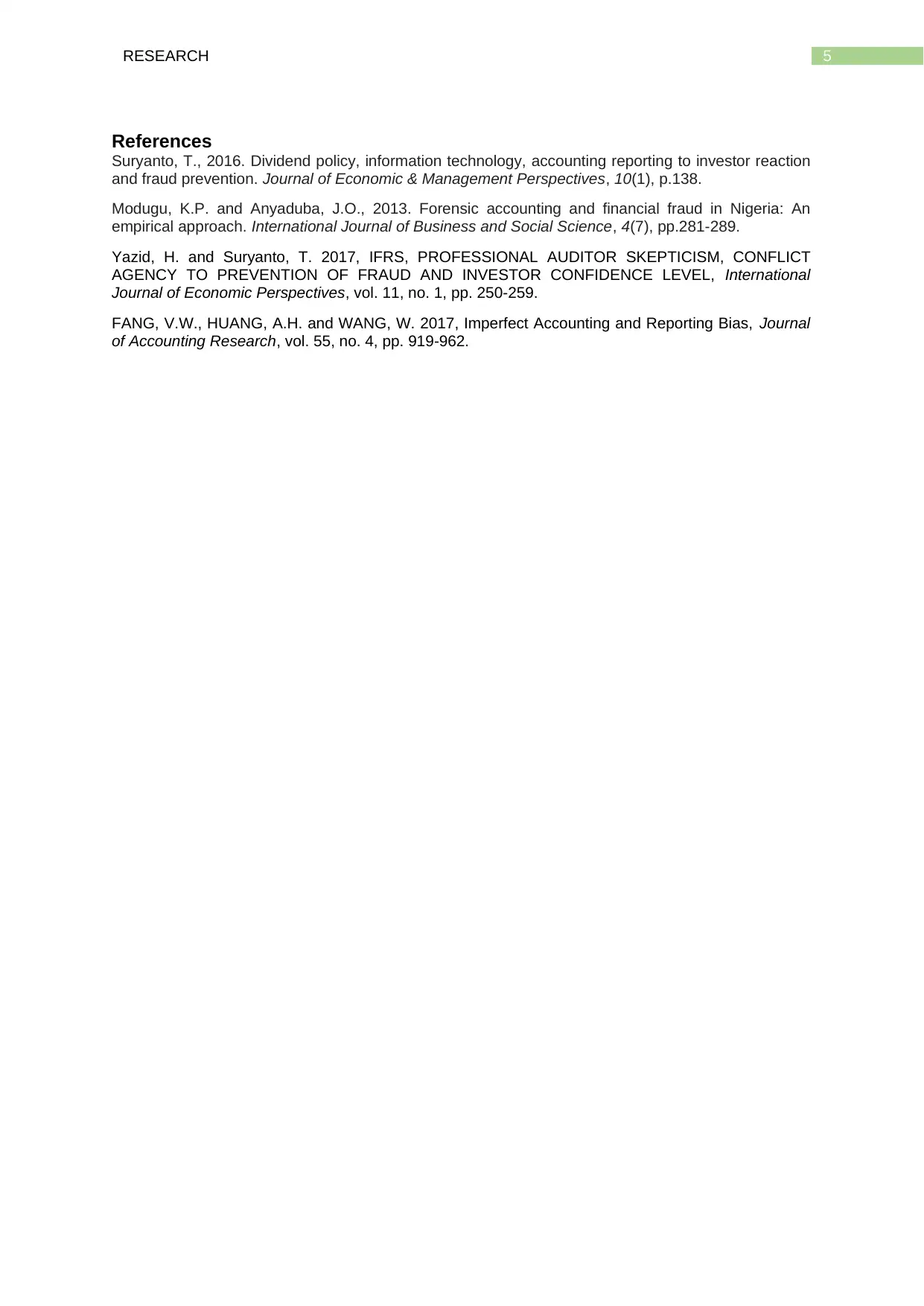
5RESEARCH
References
Suryanto, T., 2016. Dividend policy, information technology, accounting reporting to investor reaction
and fraud prevention. Journal of Economic & Management Perspectives, 10(1), p.138.
Modugu, K.P. and Anyaduba, J.O., 2013. Forensic accounting and financial fraud in Nigeria: An
empirical approach. International Journal of Business and Social Science, 4(7), pp.281-289.
Yazid, H. and Suryanto, T. 2017, IFRS, PROFESSIONAL AUDITOR SKEPTICISM, CONFLICT
AGENCY TO PREVENTION OF FRAUD AND INVESTOR CONFIDENCE LEVEL, International
Journal of Economic Perspectives, vol. 11, no. 1, pp. 250-259.
FANG, V.W., HUANG, A.H. and WANG, W. 2017, Imperfect Accounting and Reporting Bias, Journal
of Accounting Research, vol. 55, no. 4, pp. 919-962.
References
Suryanto, T., 2016. Dividend policy, information technology, accounting reporting to investor reaction
and fraud prevention. Journal of Economic & Management Perspectives, 10(1), p.138.
Modugu, K.P. and Anyaduba, J.O., 2013. Forensic accounting and financial fraud in Nigeria: An
empirical approach. International Journal of Business and Social Science, 4(7), pp.281-289.
Yazid, H. and Suryanto, T. 2017, IFRS, PROFESSIONAL AUDITOR SKEPTICISM, CONFLICT
AGENCY TO PREVENTION OF FRAUD AND INVESTOR CONFIDENCE LEVEL, International
Journal of Economic Perspectives, vol. 11, no. 1, pp. 250-259.
FANG, V.W., HUANG, A.H. and WANG, W. 2017, Imperfect Accounting and Reporting Bias, Journal
of Accounting Research, vol. 55, no. 4, pp. 919-962.
⊘ This is a preview!⊘
Do you want full access?
Subscribe today to unlock all pages.

Trusted by 1+ million students worldwide
1 out of 6
Related Documents
Your All-in-One AI-Powered Toolkit for Academic Success.
+13062052269
info@desklib.com
Available 24*7 on WhatsApp / Email
![[object Object]](/_next/static/media/star-bottom.7253800d.svg)
Unlock your academic potential
Copyright © 2020–2026 A2Z Services. All Rights Reserved. Developed and managed by ZUCOL.



